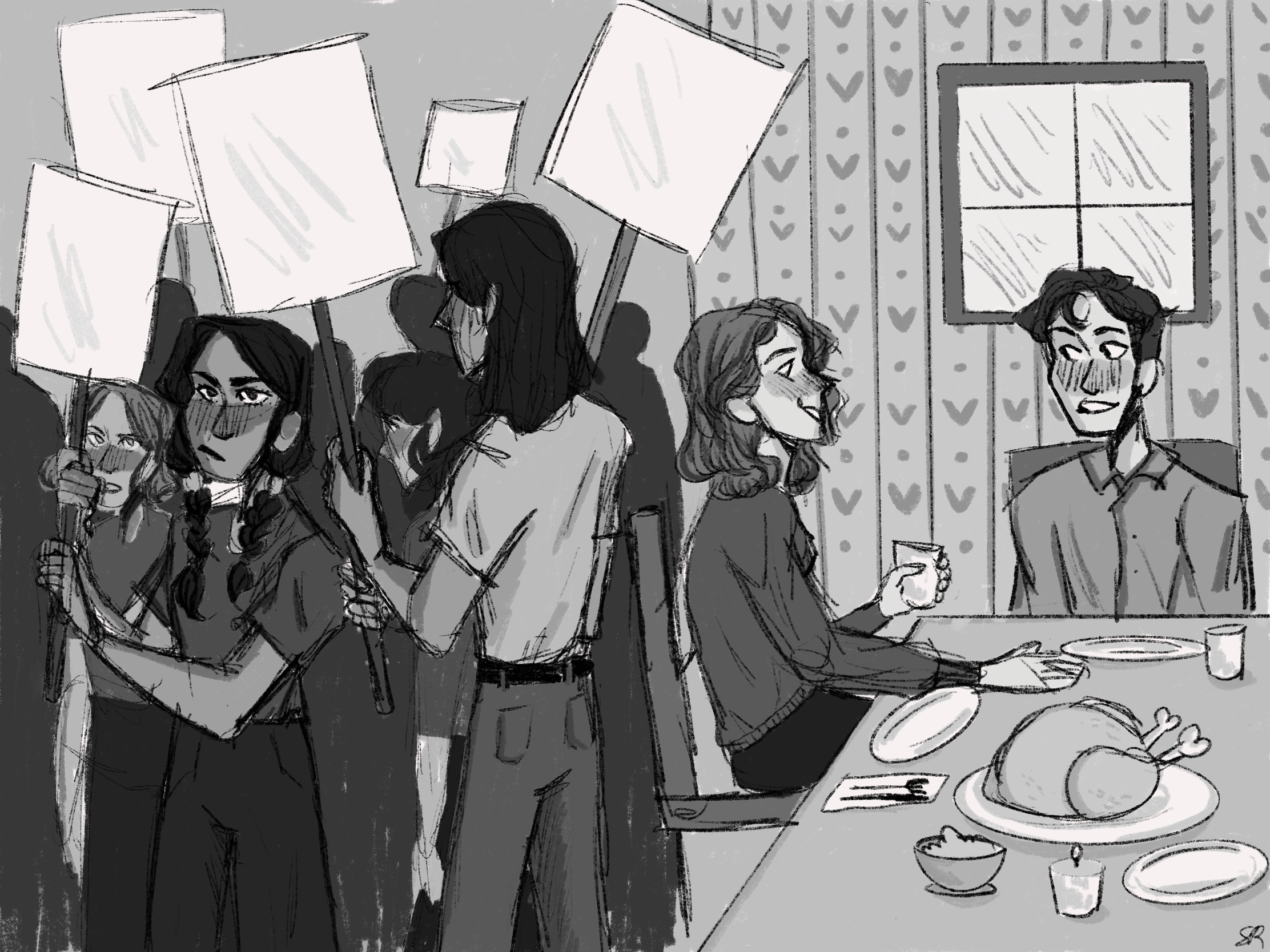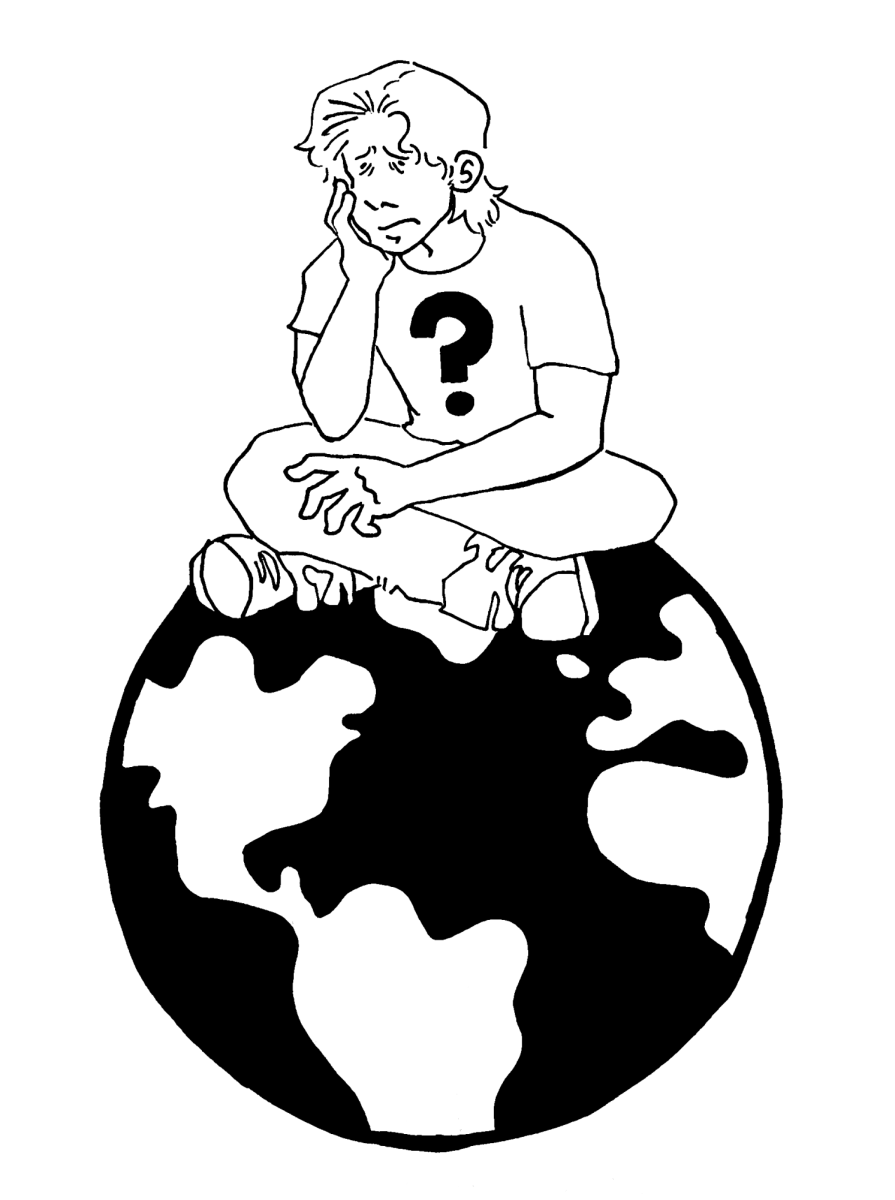We can’t celebrate Thanksgiving without acknowledging it’s dark past
Hannah Weaver, Copy Editor
Originally Published November 27, 2019
For most Americans, Thanksgiving means sitting down to a hearty turkey dinner, watching football, and celebrating with family. But not all Americans have the privilege for their Thanksgiving to look like this.
The Story of the First Thanksgiving(s)
The “First Thanksgiving” was a feast shared by the Wampanoag people and the English settlers in the fall of 1621. The typical story of the first Thanksgiving is one of a harmonious gathering between two different peoples, the start of an amicable, mutually-beneficial relationship. While there is some truth to this story, the context is often missing, and in this case, the context is everything.
As is typical of U.S. history, we’ve been told this story from the white man’s point of view. This point of view focuses on how the English colonists “helped” the Wampanoag, when really it was the other way around.
When the English first arrived, they weren’t met with hostility. In fact, they were welcomed by the Wampanoag as a potential trading partner. Also important to note is the reason the colonists were able to settle in Plymouth to begin with — the Patuxet band of Wampanoag that used to live there had been decimated by a disease brought by European traders years earlier.
Yet Wampanoag from neighboring villages still helped the colonists get through the winter, teaching them techniques for growing corn and catching fish. The meal they shared consisted of 90-some Wampanoag and 45 or less pilgrims, and while there was likely some sort of fowl served, there wasn’t any turkey.
It’s important we get this story right, and recognize that, though they didn’t have to, the Wampanoag welcomed the pilgrims.
Jolene Haas, Executive Director of the Duwamish Longhouse and Cultural Center, explained that the Duwamish had a similar reaction when the settlers came to Seattle. “They helped them survive their first winter, they helped the babies with the clam juice, they did all these things,” Haas said. “They had open arms to help people.”
Post-Thanksgiving Relations
Grade school lessons about Thanksgiving usually either stop here or imply that they all lived happily ever after. This couldn’t be further from the truth. In typical European colonizer fashion, the “pilgrims” took over the land and claimed it as their own.
As more and more settlers started coming over and they eventually spread all the way to the West Coast, they continued to commit genocide and pushed remaining natives onto tiny reservations.
If you’re confused what I mean by “genocide,” consider this: after Europeans spread diseases and the U.S. government initiated over a thousand wars and raids, only 8% of indigenous populations remained. Not only that, but they also suffered cultural genocide, in part due to boarding schools and other government institutions, that wouldn’t allow speaking native languages or practicing a religion other than Christianity.
The colonizers also brought the idea that this newly “discovered” land could be owned, and that they were the ones who should own it. “It became the mindset of the pilgrims was to attach ownership to land, which wasn’t a concept that native people could wrap their heads around,” Haas said. “[They felt that] everything was out there for everybody’s use, to survive.”
They then forced tribal leaders to sign treaties that gave the colonists “rights” to the land. In 1855, the Treaty of Point Elliott was signed, promising the Duwamish and other Coast Salish tribes fishing rights, hunting rights, and reservations in exchange for 54,000 acres of land. The promises of this treaty have never been honored, and the Duwamish have yet to be granted a reservation.
This scenario isn’t unique to the Duwamish. There were hundreds of treaties signed between Native nations and the U.S., none of which have been fully fulfilled.
A day to celebrate?
These countless injustices have led some Native Americans tribes to protest on the day of Thanksgiving. One such protest is the Day of Mourning, which was started in 1970 when anniversary planners for a Thanksgiving celebration wouldn’t allow Wampanoag leader Wamsutta to deliver a speech that detailed the abuse of his people since the arrival of the colonists.
On the 29th Day of Mourning, event organizer Moonaum James and co-leader of United American Indians of New England (UAINE), gave a speech stressing the importance of continuing to fight for indigenous rights. “We will stop protesting when the merchants of Plymouth are no longer making millions of dollars off the blood of our slaughtered ancestors” James said.
Similar events such as Unthanksgiving Day, held on the once-indigenous-occupied Alcatraz Island, occur across the country each year. However, there are almost 600 federally-recognized tribes in the U.S., so there are varying opinions on how, if at all, Thanksgiving should be celebrated.
For the Duwamish, this means focusing on the now and celebrating the heart and resilience of their people. “Getting over it doesn’t mean that it makes it right,” Haas said. “It means what are you doing now to fight for your sovereignty and for the rights of indigenous people?”
This year, the Duwamish Tribe, in conjunction with other local organizations are putting on a public Thanksgiving Feast.
Haas explained that the goal of one of the main event organizers, Al Parisi, is to reconstruct Thanksgiving into a positive celebration for all people. “What he wants to do is bring that healing and he wants to actually lift up the Duwamish for their initial story and how they helped the first pioneers here,” Haas said.
Taking action this Thanksgiving
There is nothing wrong with giving thanks and sharing a meal with loved ones. However, if you as a non-indigenous person celebrate Thanksgiving without acknowledging the broken promises made to native tribes, the genocide of indigenous people across the Americas, and the injustices that continue today, you are choosing to uphold centuries of oppression.
As students, we must educate ourselves about the Duwamish, what they’ve done, and what they continue to do for the Puget Sound area. As teachers, we must teach lessons about Thanksgiving which accurately depict the events and portray Native American points of view. As residents of Seattle, we must acknowledge that we are on Duwamish land.
But our action doesn’t have to and shouldn’t stop there. We can partake in solidarity movements such as the Real Rent project which, according to their flier, “calls on people who live and work in Seattle to make rent payments to the Duwamish Tribe.” Hundreds of years of wrongdoing cannot be undone overnight, but it’s our duty to try, since our government won’t.

























